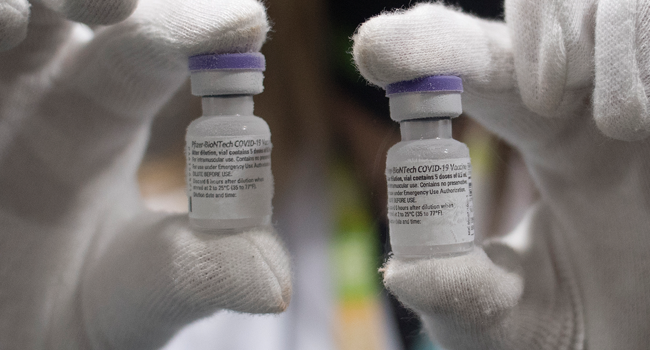Nigeria will receive 16 million doses of the AstraZeneca COVID-19 vaccines before the end of February, an official has said.
This will replace the initial 100,000 doses of the Pfizer and BioNTech approved vaccines expected in the country.
The Executive Director of the National Primary Health Care Development Agency (NPHCDA), Faisal Shuaib, announced the new development at the Presidential Task Force (PTF) on COVID-19 briefing on Monday.
He said the initial 100,000 doses of the Pfizer vaccines expected this month is grossly inadequate for Nigeria’s large population.
“The COVAX facility has informed us that they will be supplying Nigeria with approximately 16 million doses of Astrazeneca vaccine this month,” Mr Shuaib said.
“This will replace the earlier communicated 100,000 doses of Pfizer mRNA vaccine, which was grossly inadequate.”
COVAX
Most African countries, including Nigeria, are banking on benefitting from the COVAX programme, which was set-up to divide over a billion doses of vaccines across 92 low-and middle-income countries.
The facility promised access to vaccines for up to 20 per cent of participating countries’ population with an initial supply beginning in the first quarter of the year to immunise three per cent of their populations.
Through the COVAX initiative, the Nigerian government had announced that it will receive an initial 100,000 doses of the Pfizer and bioNtech by February.
across Nigeria
It also said efforts are being made to access doses of other approved vaccines suitable for storage in Nigeria.
The Oxford-AstraZeneca vaccine, which has 70 per cent efficacy, offers the best possibility for distribution in Nigeria because the temperature required is not as low as the Pfizer vaccine and manufacturers can produce it at a lower price.
This is unlike the Pfizer and BioNTech COVID-19 vaccines, which require ultra-cold freezers for effective storage.
An analysis by The Conversation Africa, an online news site, shows that the Pfizer and AstraZeneca vaccines induce immunity but in different ways.
They both deliver the instructions for how to make a target on the virus for our immune system to recognise the spike protein.
The Pfizer vaccine packages the instructions up in a droplet of fat, while the AstraZeneca vaccine packages the instructions up in the shell of a virus, the adenovirus.
At the briefing, Health Minister Osagie Ehanire said the country is experiencing a delay in receiving the first batch of vaccines because the manufacturers are yet to decide on when to deploy the vaccines.
He, however, said Nigerians should expect the first roll-out of the vaccines this month.
“The date of first arrival of vaccines in Nigeria has kept changing because the decision lies with the manufacturer, who already has heavy commitments,” he said.
Mr Ehanire noted that Nigeria has been allocated over 41million doses by the AU’s African Vaccines Acquisition Task Team (AVATT)
“Altogether, it will give us coverage for over 50 per cent of our target for 2021, if we can access all doses promised,” he said.







